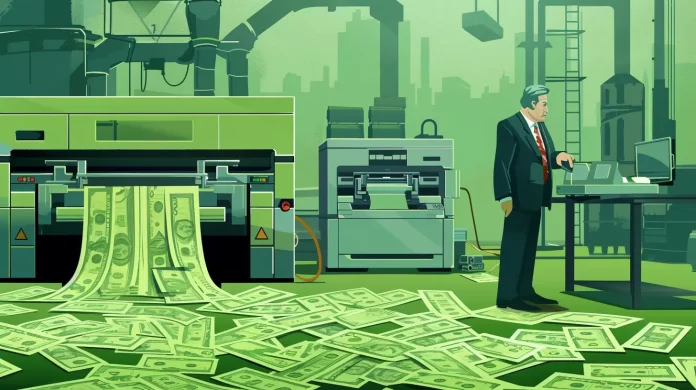WASHINGTON D.C. – In a move that has economists scrambling for their fainting couches and bartenders bracing for an influx of existential breakdowns, the government unveiled its latest plan to combat inflation: “Operation Benjamin Button Bucks.” This revolutionary initiative involves printing a brand new batch of currency, but with a twist – the bills will actually age backwards in value!
“This is a game-changer,” declared Mildred Moneybags, Secretary of the Treasury. “Imagine! Your $20 bill today will be worth a crisp, inflation-busting $100 tomorrow! That loaf of bread costing you an arm and a leg? No problem, just wait a week and it’ll practically pay for itself!”
Secretary Moneybags, known for her fondness for monocles and top hats even in the sweltering D.C. summer, further elaborated on the intricacies of the plan. “We’ve partnered with a consortium of time-traveling hedge funds and artisanal paperclip manufacturers to create these revolutionary bills. We call them ‘Benjamins’ because who wouldn’t want their money to act like the ageless Benjamin Button?”
While Secretary Moneybags basked in the glow of her self-proclaimed genius, murmurs of concern rippled through the financial community. Renowned economist Dr. Bartholomew Boom, known for his uncanny ability to predict economic trends based on the migration patterns of squirrels, expressed his reservations. “This plan raises several…quirky questions,” he stammered, nervously adjusting his pocket protector. “First, what happens if your wallet becomes a time vortex, aging your money faster than anticipated? You could end up paying for a latte with a bill that vanishes mid-transaction!”
Dr. Boom’s concerns were echoed by average citizens on the street.
“I don’t understand this time-traveling money business,” said a bewildered retiree clutching a grocery list. “Will my retirement fund age backwards too? Will I magically become younger and have to go back to work?”
Meanwhile, a group of enterprising millennials were already formulating strategies to exploit the loopholes in the plan.
“This is basically free money!” declared a young entrepreneur, his eyes gleaming with dollar signs. “We just need to invest in high-interest savings accounts that accrue interest based on future value. By the time we withdraw our money, it’ll be worth a fortune!”
The government, however, seems unfazed by these concerns. They’ve even launched a catchy public awareness campaign featuring a tap-dancing Abraham Lincoln singing about the joys of “Benjamins.”
The long-term effects of “Operation Benjamin Button Bucks” remain to be seen. Will the economy experience a hyperinflationary time warp? Will everyone become obsessed with hoarding cash under their mattresses in fear of spontaneous monetary disintegration? Only time – or rather, the complete lack thereof – will tell.


